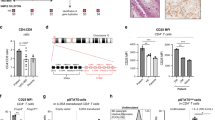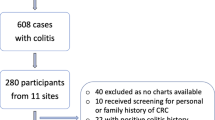Abstract
Objectives
The Cannabinoid Receptor type 2 (CB2) is involved in inflammation and immune cell modulation. In previous studies, we demonstrated the association between the CNR2 rs35761398 polymorphism and the risk for pediatric inflammatory bowel disease (IBD). In this study, we analyzed the intestinal biopsies from Crohn disease (CD) and ulcerative colitis (UC) pediatric patients at the diagnosis to evaluate the expression of CB2 and several factors associated with IBD inflammatory pathways.
Methods
We enrolled five patients with CD, five with UC, and five controls (CTR). We analyzed ileum and rectum biopsies from patients of each group evaluating the expression of CB2, Toll-like receptor 4, interleukin-6, and interleukin-1β by western blot and immunofluorescence.
Results
Western blot analysis showed a significant increase of CB2 in the CD ileum and in the UC rectum biopsies and an increase of TLR4 in the UC rectum. We also observed a significant over-expression of the IL-6 in UC rectum. The immunofluorescence analysis confirmed western blot data, showing also a T-lymphocytes infiltration colocalized with CB2 expression in the CD ileum and UC rectum.
Conclusions
Our results show an upregulation of CB2 in pediatric IBD, which might have implications for drug discovery.
Impact
-
The Cannabinoid Receptor type 2 (CB2) is involved in the inflammation and modulation of the immune response in pediatric inflammatory bowel disease (IBD).
-
CB2 receptor is more expressed in the inflamed intestine of pediatric IBD patients.
-
CB2 could be used as a potential therapeutic target to reduce IBD-related inflammatory state in childhood.
Similar content being viewed by others
Log in or create a free account to read this content
Gain free access to this article, as well as selected content from this journal and more on nature.com
or
Data availability
The raw data supporting this article will be made available by the authors without reservation.
References
Nasser, Y., Bashashati, M. & Andrews, C. N. Toward modulation of the endocannabinoid system for treatment of gastrointestinal disease: FAAHster but Not “Higher”. Neurogastroenterol. Motil. 26, 447–454 (2014).
Miller, A. M. et al. CB2 receptor-mediated migration of immune cells: it can go either way. Br. J. Pharm. 153, 299–308 (2008).
Rossi, F. et al. Cannabinoid Receptor Type 2 functional variant influences liver damage in children with non-alcoholic fatty liver disease. PLoS One 7, e42259 (2012).
Strisciuglio, C. et al. Cannabinoid Receptor 2 functional variant contributes to the risk for pediatric inflammatory bowel disease. J. Clin. Gastroenterol. 52, e37–e43 (2018).
Cencioni, M. T. et al. Anandamide suppresses proliferation and cytokine release from primary human T-lymphocytes mainly via Cb2 receptors. PLos One 5, e8688 (2010).
Wright, K. et al. Differential expression of cannabinoid receptors in the human colon: cannabinoids promote epithelial wound healing. Gastroenterology 129, 437–453 (2005).
Argenziano, M. et al. The endocannabinoid system in pediatric inflammatory and immune diseases. Int. J. Mol. Sci. 20, 5875 (2019).
MacDermoit, R. P. Alterations of the mucosal immune system in inflammatory bowel disease. J. Gastroenterol. 31, 907–916 (1996).
Farzaei, M. H. et al. A mechanistic review on plant-derived natural compounds as dietary supplements for prevention of inflammatory bowel disease. Expert Rev. Gastroenterol. Hepatol. 10, 745–758 (2016).
Lu, Y. et al. Toll-like receptors and inflammatory bowel disease. Front Immunol. 9, 72 (2018).
Toiyama, Y. et al. The expression patterns of Toll-like receptors in the ileal pouch mucosa of postoperative ulcerative colitis patients. Surg. Today 36, 287–290 (2006).
Levine, Y. Y. et al. ESPGHAN revised Porto criteria for the diagnosis of inflammatory bowel disease in children and adolescents. Zhonghua Er Ke Za Zhi. 54, 728–732 (2016).
Takiishi, T., Fenero, C. I. M. & Camara, N. O. S. Intestinal barrier and gut microbiota: shaping our immune responses throughout life. Tissue Barriers 5, e1373208 (2017).
Svizenska, I. et al. A Cannabinoid receptor 1 and 2 (CB1 and CB2), their distribution, ligands and functional involvement in nervous system structures-a short review. Pharm. Biochem Behav. 90, 501–511 (2008).
Zhang, H. et al. Antagonism of cannabinoid receptor 1 attenuates the anti-inflammatory effects of electroacupuncture in a rodent model of migraine. Acupunct. Med. 34, 463–470 (2016).
Ihenetu, K. et al. Inhibition of interleukin-8 release in the human colonic epithelial cell line HT-29 by cannabinoids. Eur. J. Pharmacol. 458, 207–215 (2003).
Mahida, Y. R. et al. Enhanced synthesis of neutrophil-activating peptide-1/interleukin-8 in active ulcerative colitis. Clin. Sci. (Lond.). 82, 273–275 (1992).
Mathison, R. et al. Effects of cannabinoid receptor-2 activation on accelerated gastrointestinal transit in lipopolysaccharide-treated rats. Br. J. Pharmacol. 142, 1247–1254 (2004).
Leinwand, K. L., Gerich, M. E., Hoffenberg, E. J. & Collins, C. B. Manipulation of the endocannabinoid system in colitis: a comprehensive review. Inflamm. Bowel Dis. 23, 192–199 (2017).
Uranga, J. A. et al. Cannabinoid pharmacology and therapy in gut disorders. Biochem Pharm. 157, 134–147 (2018).
Pellati, F. et al. Cannabis sativa L. and nonpsychoactive cannabinoids: their chemistry and role against oxidative stress, inflammation, and cancer. Biomed. Res. Int. 2018, 1691428 (2018).
Liao, W. et al. Chelidonine suppresses LPS-Induced production of inflammatory mediators through the inhibitory of the TLR4/NF-κB signaling pathway in RAW264.7 macrophages. Biomed. Pharmacother. 107, 1151–1159 (2018).
Shao, B. Z. et al. Targeting Nlrp3 inflammasome in inflammatory bowel disease: putting out the fire of inflammation. Inflammation 42, 1147–1159 (2019).
Suryavanshi, S. V., Kovalchuk, I. & Kovalchuk, O. Cannabinoids as key regulators of inflammasome signaling: a current perspective. Front. Immunol. 11, 613613 (2021).
Author information
Authors and Affiliations
Contributions
C.S.: conceptualization, project administration, validation, and writing original draft. M.C.: investigation, data collection, acquisition, analysis, and interpretation of data. C.T.: investigation, resources, acquisition, analysis, and interpretation of data, review. S.P.: acquisition, analysis, and interpretation of data. M.M.: review and editing. E.M.: review and editing. L.L.: conceptualization, project administration, supervision and final approval of the version to be published. F.R.: conceptualization, project administration, supervision and final approval of the version to be published. All authors had access to the study data and have approved the final manuscript.
Corresponding author
Ethics declarations
Competing interests
The authors declare no competing interests.
Ethics approval
The Ethics Committee of the University “Vanvitelli” approved the study protocol with the registration number Prot. 0013347/i. Written informed consent was obtained from parents and approval was acquired from children before any interventions.
Additional information
Publisher’s note Springer Nature remains neutral with regard to jurisdictional claims in published maps and institutional affiliations.
Rights and permissions
About this article
Cite this article
Strisciuglio, C., Creoli, M., Tortora, C. et al. Increased expression of CB2 receptor in the intestinal biopsies of children with inflammatory bowel disease. Pediatr Res 93, 520–525 (2023). https://doi.org/10.1038/s41390-022-02109-5
Received:
Revised:
Accepted:
Published:
Version of record:
Issue date:
DOI: https://doi.org/10.1038/s41390-022-02109-5
This article is cited by
-
Cannabidiol as a multifaceted therapeutic agent: mitigating Alzheimer's disease pathology and enhancing cognitive function
Alzheimer's Research & Therapy (2025)



